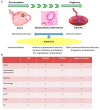Vitamin D Effects on the Immune System from Periconception through Pregnancy
- PMID: 32429162
- PMCID: PMC7284509
- DOI: 10.3390/nu12051432
Vitamin D Effects on the Immune System from Periconception through Pregnancy
Abstract
Vitamin D is a well-known secosteroid and guardian of bone health and calcium homeostasis. Studies on its role in immunomodulatory functions have expanded its field in recent years. In addition to its impact on human physiology, vitamin D influences the differentiation and proliferation of immune system modulators, interleukin expression and antimicrobial responses. Furthermore, it has been shown that vitamin D is synthesized in female reproductive tissues and, by modulating the immune system, affects the periconception period and reproductive outcomes. B cells, T cells, macrophages and dendritic cells can all synthesize active vitamin D and are involved in processes which occur from fertilization, implantation and maintenance of pregnancy. Components of vitamin D synthesis are expressed in the ovary, decidua, endometrium and placenta. An inadequate vitamin D level has been associated with recurrent implantation failure and pregnancy loss and is associated with pregnancy-related disorders like preeclampsia. This paper reviews the most important data on immunomodulatory vitamin D effects in relation to the immune system from periconception to pregnancy and provides an insight into the possible consequences of vitamin D deficiency before and during pregnancy.
Keywords: assisted reproduction; immune system; preeclampsia; pregnancy; recurrent pregnancy loss; reproductive tissue; vitamin D; vitamin D deficiency.
Conflict of interest statement
The authors declare no conflict of interest.
Figures


References
-
- Schröder-Heurich B., Von Versen-Höynck F. Vitamin D Deficiency and Fertility-An Overview. Springer International Publishing; Berlin/Heidelberg, Germany: 2017. Famine, Starvation and Nuttrient Deprivation: From Biology to Policy. - DOI
-
- Aleyasin A., Hosseini M.A., Mahdavi A., Safdarian L., Fallahi P., Mohajeri M.R., Abbasi M., Esfahani F. Predictive value of the level of vitamin D in follicular fluid on the outcome of assisted reproductive technology. Eur. J. Obstet. Gynecol. Reprod. Biol. 2011;159:132–137. doi: 10.1016/j.ejogrb.2011.07.006. - DOI - PubMed
Publication types
MeSH terms
Substances
LinkOut - more resources
Full Text Sources
Medical

